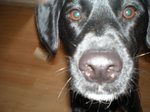His first question was funny.
My advisor had slipped my father (a marketing consultant, not a biochemist) a piece of paper with a query that he should pose during the question period of my dissertation defense.
"Have you considered a possible role for the yeast 14-3-3 proteins as regulators of the phosphorylation event you've discussed today?" he asked, having no comprehension of the words that were coming out of his mouth.
"That's a very interesting question, Dad," I responded. "In fact, I have considered such a role for these proteins, as you might have known this had you been paying attention during the conclusion of my presentation." He had of course been paying attention--he'd videotaped my every word and gesture for posterity. The language barrier, however, for the uninitiated can be intense, as every other word in such a presentation tends unavoidably toward the jargonish. Phrases like "altered sensitivity to an adenine analog", "half-time of dephosphorylation in the absence of de novo phosphate addition" and "multimerization of heterotrimers into higher-order structures" can be overwhelming even to a scientist working in a different subfield.
The audience laughed at our little exchange, certainly not a typical Ph.D. defense Q & A. I prepared to take other (legitimate) questions, but he continued with a new line of interrogation, this time of his own invention, asking about the naming conventions of yeast genes: "Why are your words sometimes in capitals and other times in lower case?"
I laughed politely and asked, "Are there any other questions?" I asked, attempting to restore some semblance of post-presentation normalcy.
"And, sometimes, you have them in italics!" he added, enthusiastically, to scattered chuckles in the audience. It was clear from his exuberance that my dad was in fact proud of me. It was also clear that he'd never been to a biochemistry dissertation defense before (most haven't).
Fortunately, my dissertation committee was (nearly) as supportive as my father. In the closed-door portion of the exam (no proud fathers allowed), the committee members asked a few obligatory questions to ensure that I was capable of sustaining scientific conversation. Four of the five members were willing to accept my dissertation without revision. The fifth member I had run into at a Pittsburgh Pirates baseball game two nights prior.
 "Shouldn't you be studying?" she had asked me at the home plate entrance to PNC Park in front of the Honus Wagner statue.
"Shouldn't you be studying?" she had asked me at the home plate entrance to PNC Park in front of the Honus Wagner statue."Shouldn't you be reading my dissertation?" I retorted, feigning confidence. Touché.
"It's on my things-to-do list--I'll read it by Monday," she promised.
She lived up to her word--and then some. In fact, she read the document more thoroughly than the other committee members and was equipped with a list of questions and concerns. "Why didn't you include a discussion of the connection between XYZ enzyme and the subject of your work?" she asked.
"Well," I began, attempting to craft a careful response, "There was one paper written that connects these two in the manner to which you elude. It was written by a research group in Wisconsin, but as far as I know, there hasn't been any additional significant work corroborating this linkage."
"There is one other paper," she responded.
"I'm not aware of it," I replied.
"I wrote it."
My advisor and I responded, simultaneously: "You did?!"
She did.
Fortunately, despite my oversight, she and the other committee members were willing to sign off on my magnum opus, asking for minimal adjustments (two to three additional paragraphs). Forms were signed and handshakes exchanged, and the deed was done: I had passed my final exam.
 Bonus feature for today's blog entry:
Bonus feature for today's blog entry:Pictured at left is one artist's rendering (mine) of the heterotrimeric enzyme that is the subject of my dissertation research. For the sake of the pseudoanonymity I manage to maintain on the blog, I have replaced the protein names with their generic designations: alpha, beta, and gamma.



9 comments:
It was very impressive how you were able to defend your thesis non-violently. It is proably a good thing I am not a PhD student. I would have brought a crossbow so I would not need to leave the front of the room to ward off inquiries.
Best brownies ever.
May I be the first to blogratulate.
Yay! Congrats! Your post reminds me of a post I've been meaning to write regarding questioning during seminars...I'll let you know when it's up.
'til then, drink away, my fellow doctored friend!
Congratulations, Yajeev!
Excellent! Congratulations! What's next for Yajeev?
andy...
academia needs more vigilantes like you in its ranks--sniping from the ivory towers all who would challenge any of its propositions.
russ...
you were the first by good hour and a half. thanks.
fellow doctor unreaction...
i'lll be looking for your post. til' then, i think all i'll be drinking might be robitussin-the day after the defense, my body decided it was time to give up the fight against this sort of nasty head cold.
trevor...
thanks! lunch soon?
mike...
thanks! next? full-time blogging, perhaps. if that doesn't work out, i've got a postdoctoral research position lined up in a lab in new haven, connecticut. we're moving in two months. in the mean time, i'll be teaching a class at our local community college. should be good for some bloggable moments.
I always (try to) be first.
it looks like a submarine...i mean, congrats.
russ...
you always (try to) be first in my book.
watchwhathappens...
that's the first time i've heard submarine... my enzyme sketches have been likened before to sea monsters emerging from murky waters.
Post a Comment